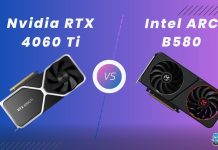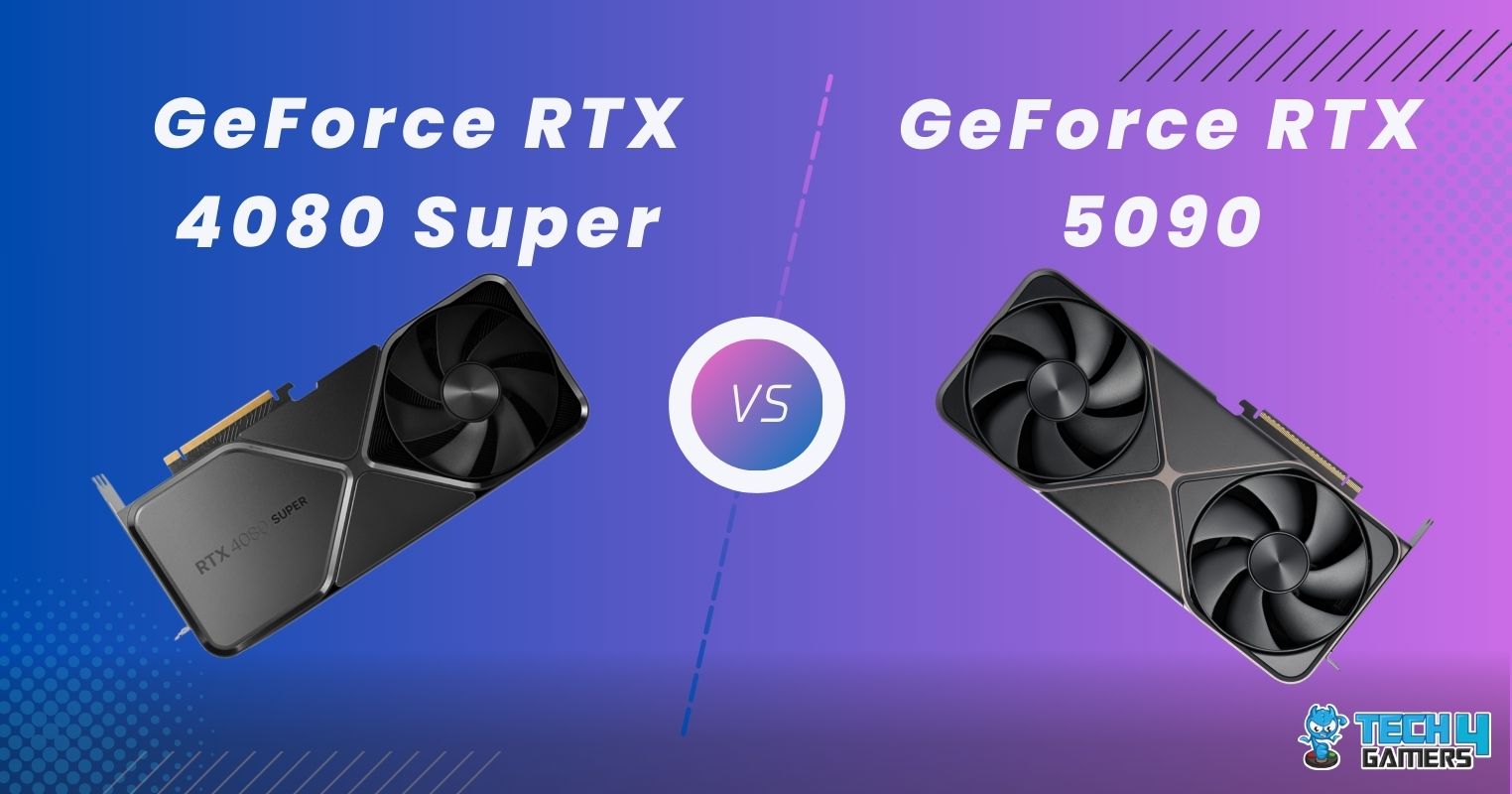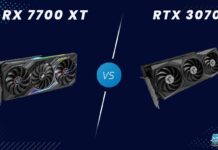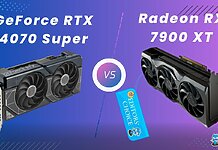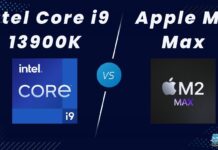Embarking on a journey through the digital landscape, we venture into the exciting showdown between the Core i9 13900K vs M2 Pro. As we peel back the layers of technical intricacies and dive into performance benchmarks, we aim to unravel the enigma surrounding these two technological giants.
Key Takeaways
- The Core i9 13900K establishes its supremacy across multiple benchmarks by 16.3% and 73.7% in single-core and multi-core tasks, displaying notable leads in five tests.
- In contrast, the M2 Pro strikes a delicate equilibrium between power and efficiency. Its lower 30W TDP, when compared to the Core i9’s 125W, renders the M2 Pro a well-suited option for individuals who prioritize energy saving.
- Addressing diverse memory requirements, the Core i9 13900K extends support for memory configurations of up to 128GB DDR5-5600 and DDR4-3200. In contrast, the M2 Pro accommodates up to 32GB LPDDR5-6400.
- For users placing paramount importance on error correction capabilities during critical computing tasks, the Core i9 13900K’s support for ECC memory emerges as a crucial advantage.
Comparison Table
| Key Specifications | M2 Pro | Core i9 13900K |
|---|---|---|
| Vendor | Apple | Intel |
| Release Date | January 17, 2023 | September 27, 2022 |
| Device Type | Laptop | Desktop |
| Instruction Set | ARMv8 | x86-64 |
| Integrated GPU | Apple M2 Pro GPU (19-core) | UHD Graphics 770 |
| Performance Cores | 8 | 8 |
| Performance Threads | 8 | 16 |
| Base Clock | 2.4 GHz | 3.0 GHz |
| Boost Clock | 3.5 GHz | 5.4 GHz |
| Total Cores | 12 | 24 |
| Total Threads | 12 | 32 |
| L1 Cache | 192K (per core) | 80K (per core) |
| L2 Cache | 32MB (shared) | 2MB (per core) |
| Transistors | 40 billion | 1.42 billion |
| Fabrication Process | 5nm | 10nm |
| TDP (PL1) | 30W | 125W |
| Socket | Apple M-Socket | LGA-1700 |
| GPU Base Clock | 450 MHz | 300 MHz |
| GPU Boost Clock | 1398 MHz | 1650 MHz |
| Cuda Cores | 2432 | 256 |
| Display Capabilities | 7680×4320 – 60 Hz | – |
| Memory Support | Up to 32 GB LPDDR5-6400 | Up to 128GB
– DDR5-5600, |
| ECC Support | No | Yes |
| Max. Memory Bandwidth | 204.8 GB/s | 89.6 GB/s |
Core i9 13900K Vs M2 Pro: Architectural Differences
While the M2 Pro and Core i9 13900K originate from different manufacturing nodes and exhibit unique clock speeds, these distinctions lay the foundation for exploring their diverse performance capabilities. Delving into the architectural nuances, we can now shift our focus to the real-world impact of these specifications through performance benchmark analysis.
- Process Node: Where innovation converges, the M2 Pro harnesses the prowess of the 5nm process node, contrasting the Core i9 13900K’s technological prowess rooted in the 10nm process node.
- Clock Speed: Unleashing computational potential, the M2 Pro beckons with a Base Clock of 2.4 GHz and a Boost Clock of 3.5 GHz, while the Core i9 13900K asserts dominance with a Base Clock of 3.0 GHz and a Boost Clock of 5.4 GHz.
- Memory Support Variation: Navigating memory horizons, the M2 Pro sets its sights with support for up to 32GB LPDDR5-6400, charting a unique path as the Core i9 13900K opens doors to 128GB – DDR5-5600, – DDR4-3200 memory landscape.
- TDP: Bridging efficiency and power, the M2 Pro gracefully balances with a 30W TDP against the Core i9 13900K’s commanding 125W TDP, each tailored to distinct performance domains.
- Supported Technologies: As the technological differences unfold, the Core i9 13900K resonates with ECC memory support, a characteristic absent from the M2 Pro, echoing the essence of enhanced reliability and precision.
Also Check: Apple M2 Pro Vs Apple M2
Performance Benchmarks
The true test of computing might lie in the performance benchmarks, where we uncover the practical implications of the architectural disparities. By subjecting the M2 Pro and Core i9 13900K to a battery of rigorous tests, we can unravel how they perform to dictate their prowess in various benchmark software.
Cinebench R23 (Single-Core)
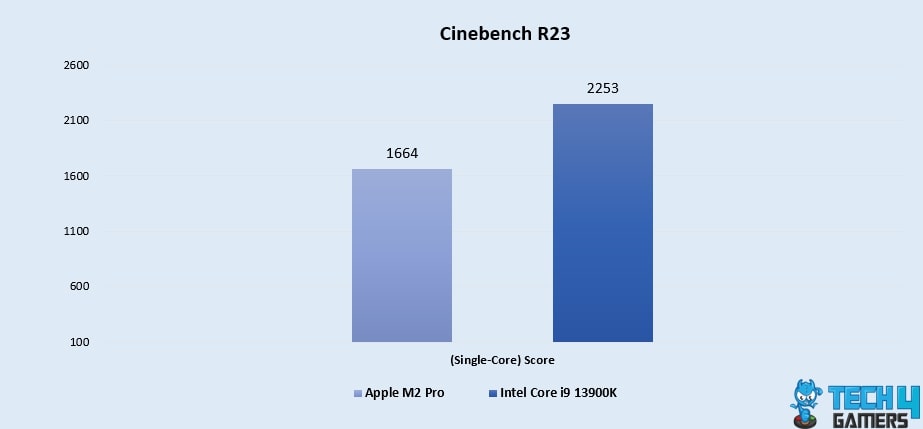
- Starting off, the Core i9 13900K boasts a substantial 30% lead in single-core performance over the M2 Pro, demonstrating its superiority in individual task efficiency with a score of 2253 compared to the M2 Pro’s 1664.
Cinebench R23 (Multi-Core)
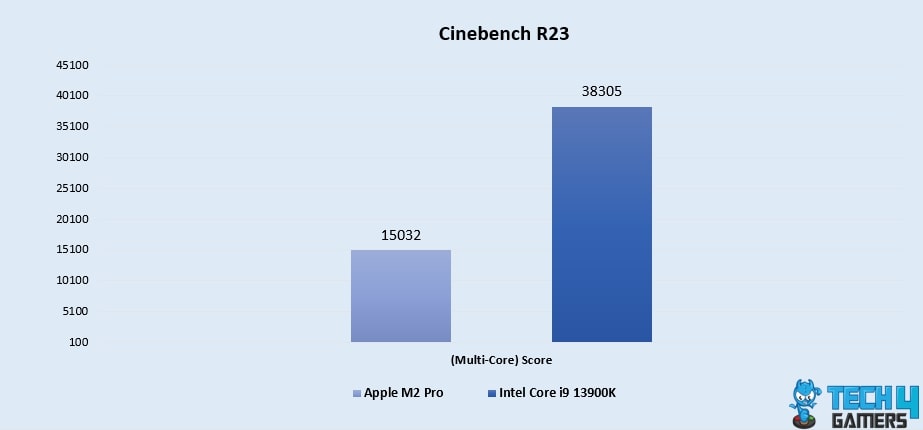
- Moreover, the Core i9 13900K showcases an impressive 87.2% advantage in multi-core performance, delivering a score of 38305, while the M2 Pro follows closely with a score of 15032, demonstrating their respective capabilities.
Passmark CPU (Single-Core)
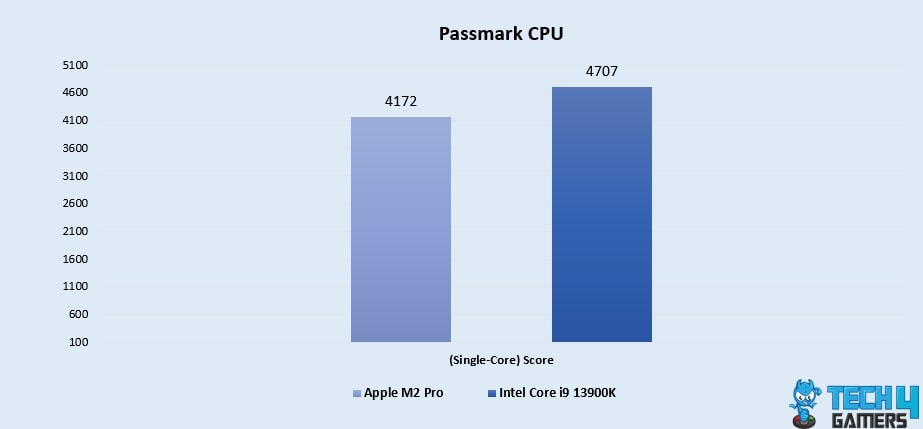
- With a 12% lead, the Core i9 13900K achieves a single-core Passmark CPU score of 4707, surpassing the M2 Pro’s score of 4172, reflecting its efficiency in single-core processing tasks.
Passmark CPU (Multi-Core)
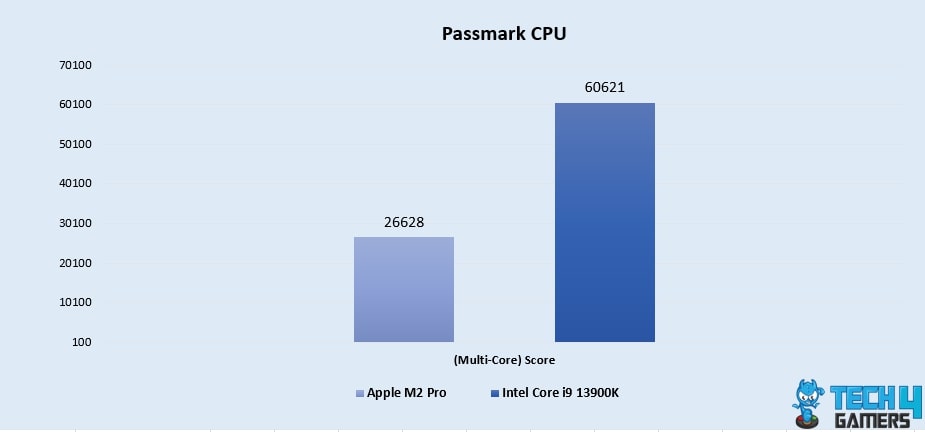
- Furthermore, the Core i9 13900K showcases a significant 77.9% lead in multi-core performance with a score of 60621, while the M2 Pro achieves a score of 26628, illustrating their respective prowess in tackling demanding multitasking scenarios.
Also Read: Apple M2 Pro Vs Apple M1 Pro
Geekbench 5 (Single-Core)
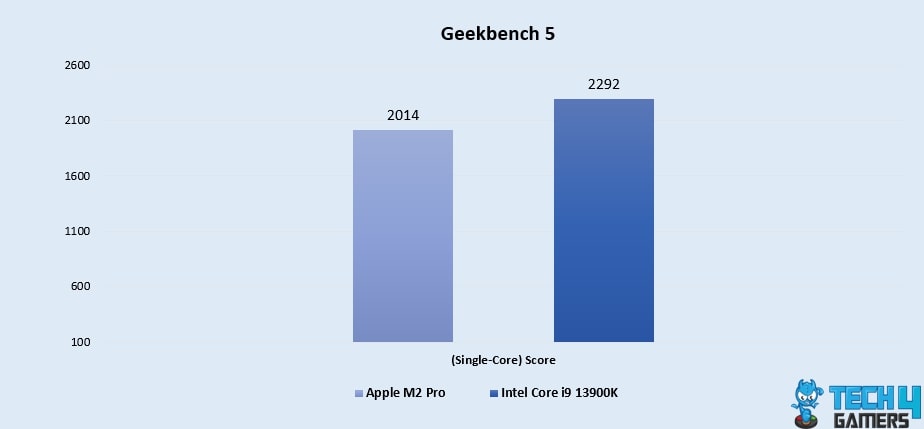
- In addition, the Core i9 13900K maintains its lead with a 12.9% advantage in single-core performance, scoring 2292, while the M2 Pro achieves 2014, demonstrating its efficiency in single-core tasks.
Geekbench 5 (Multi-Core)
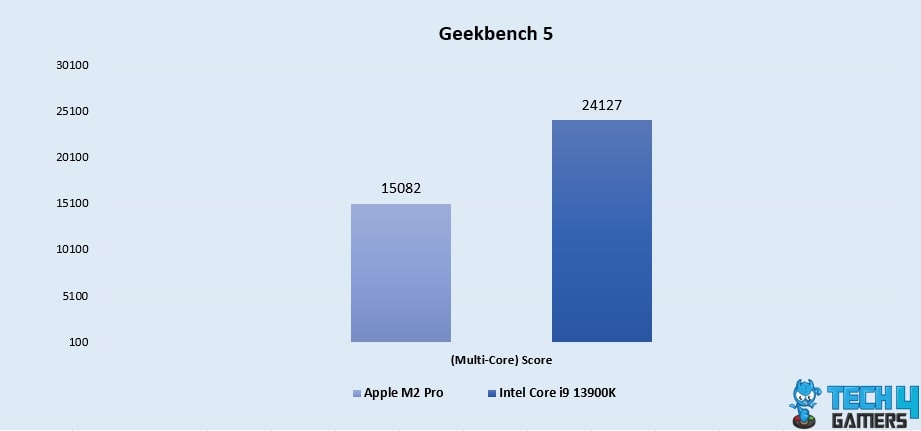
- Finally, in multi-core tasks, the Core i9 13900K maintains its lead with a 46.1% advantage, achieving a score of 24127, while the M2 Pro scores 15082, showcasing its capabilities in handling complex multi-threaded workloads.
Core i9 13900K Vs M2 Pro: Which Chip Is More Suitable?
- The Core i9 13900K asserts its dominance across various benchmarks, showcasing significant leads in 5 tests by 16.3% and 73.7% in single-core and multi-core tasks. If you seek unparalleled processing power, Core i9 is the optimal choice.
- While the Core i9 13900K excels in raw performance, the M2 Pro strikes a balance between power and efficiency. With a lower 30W TDP compared to the Core i9’s 125W, the M2 Pro suits energy-conscious users seeking a versatile computing experience.
- Moreover, the Core i9 13900K supports memory configurations of up to 128GB DDR5-5600 and DDR4-3200, catering to memory-intensive apps. Meanwhile, the M2 Pro offers up to 32GB LPDDR5-6400, ensuring a wide range of options for demanding tasks.
- For users prioritizing error correction capabilities in critical computing tasks, the Core i9 13900K’s support for ECC memory provides enhanced reliability and accuracy, a feature not present in the M2 Pro.
Thank you! Please share your positive feedback. 🔋
How could we improve this post? Please Help us. 😔
Feedback By:
[Comparisons Expert]
Shehryar Khan, a seasoned PC hardware expert, brings over three years of extensive experience and a deep passion for the world of technology. With a love for building PCs and a genuine enthusiasm for exploring the latest advancements in components, his expertise shines through his work and dedication towards this field. Currently, Shehryar is rocking a custom loop setup for his built.
Get In Touch: shehryar@tech4gamers.com


 Threads
Threads